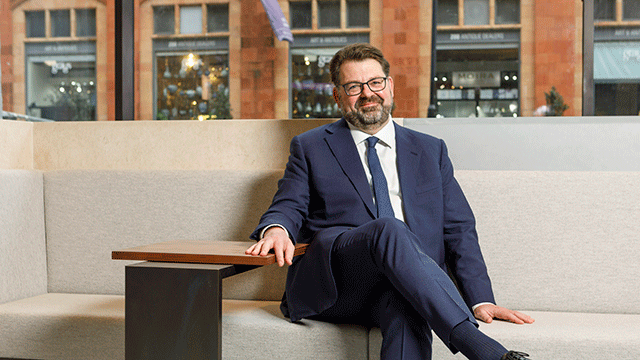When asked whether he had any regrets as his term as chair of the Westminster Property Association came to an end, Landsec managing director Marcus Geddes paused to think.
“Choice of vice-chair?” quipped James Raynor, chief executive of Grosvenor Property UK and WPA vice-chair, seated to his side in an interview with Estates Gazette.
Raynor took charge of the WPA, which represents more than 240 real estate companies operating in the borough, at the organisation’s annual general meeting at the Howard de Walden Estate’s Hale House at 76-78 Portland Place, W1, on Tuesday evening.
Speaking at the event, Raynor thanked his predecessor for his “exceptional leadership”, and for being “a champion for growth” as he “spearheaded the engagement with Westminster in the Partial Review of the City Plan.
He also pointed to Geddes’ success in opening opportunities for aspiring youngsters to get experience in the industry, as well as working to create the Sustainable City Charter, which now has 100 signatories and represents over 40m sq ft of commercial space.
“We have the opportunity within this association to convene the best of the long-term investors and actors in the real estate sector in Westminster,” Geddes said when the duo sat down with Estates Gazette at Grosvenor’s offices ahead of the event.
“And that gave us the opportunity to bring together views around the ‘retrofit first, not retrofit only’ approach… which was something that the industry pioneered.”
Early signatories to the charter, including companies such as Derwent London, Whitbread and Shaftesbury Capital, have reduced their average energy use per sq m by almost a fifth in the charter’s first year.
“That’s meaningful. That’s real change,” Geddes said. “And I think shows the benefit of a collective approach and not individuals trying to solve problems and come up with ideas in their own locker rooms, but actually bringing industry expertise together.”
Stepping back
It was this sort of impact which Geddes felt he would remember best, particularly in relation to the WPA’s Mastering My Future employability scheme, a 12-month programme for 14-25-year-olds from Westminster and Kensington.
The WPA announced in 2023 that it would be running the scheme in partnership with the Young Westminster Foundation charity to support local young people in taking their first steps into their careers.
The most recent cohort had just attended the WPA’s annual lunch, which Geddes described as a “high point”.
“What I witnessed there when we put this programme together was something that actually takes the industry out to people who would otherwise not necessarily be exposed to it,” he said.
“If two or three of them – of that 18, which is the current cohort – ended up getting jobs and getting in the sector, that’s fantastic. That’s real change and something that we’ve actually delivered.”
Raynor added: “And the hope, of course is that having made such a positive start, what you get is a momentum building… So you’ve certainly made my job easier. I can just come in and keep doing what Marcus has been doing.”
Greater links
Which is largely what Raynor said he would do in many regards, be it advising on planning policy or collaborating with Westminster’s first Labour-controlled council.
But in his speech on Tuesday, he also said he would be placing emphasis on “communicating the benefits of our sector’s investment – winning hearts and minds”.
“The social value delivered through development is invariably overlooked by the public, and far too often the funds generated through it are hidden from view, or even worse, unspent,” Raynor said.
He pointed to research published last year by the Home Builders Federation, which found that local authorities in England and Wales were sitting on over £8bn paid by developers via s. 106 and Community Infrastructure Levy payments.
“I think it’s a lot about transparency, understanding the amount of s. 106 and CIL that comes from our activity,” Raynor told Estates Gazette. “Why aren’t we using that?”
He said he would be working with the council to ensure the funds are put to good use and in a way that communicates the value property investment can bring.
“It’s that sort of principle, so that people are saying, ‘That’s great, we’ve got this new school’,” he said.
“Otherwise, if you’re a resident, you mainly see the disruption or a nice building, but it doesn’t do anything to specifically say, ‘This is unlocking things that are important to me as a local member of the community’.”
Geddes concurred and said the issue was one which he could have “left more of a mark on.”
Citing a speech by London’s deputy mayor for business Howard Dawber at a WPA event last summer, Geddes said: “No one ever sees property developers as heroes… when you’re talking about good growth, it actually is an opportunity to celebrate what the industry does.
“I would love to have seen a greater understanding, a greater link between the benefits of what the industry can do and not have the industry perceived as the sort of profit-grabbing, arrive, take and leave.”
Instead, he said, it should be communicated that the industry is awake to the need for building relations with the local community – and Raynor agreed.
“You need an absolute licence to operate and that is a form of social contract. That shows that you’re not purely altruistic, but you’re not just doing it for yourself,” he said. “I think that our members have moved on quite a bit in that understanding.”
Peer network
Asked whether he planned to continue to advise Raynor as his own predecessor, Derwent chief executive Paul Williams, has, Geddes replied: “You won’t need or want it, James, but I’ve enjoyed the opportunity to work with Paul and to get to know him better and that has enabled [me] to ask for his opinion.
“I’ve certainly enjoyed the benefits from having the opportunity created by this to be more than just industry colleagues who work together.”
Raynor, who has Dan Nicholson, executive director at Great Portland Estates, as his own vice-chair and successor at the end of his two-year term, agreed: “Once you get into the positions and the start of the board [at the WPA] you actually realise you are creating a peer network that goes beyond just people who work in the same industry and occasionally meet.”
Indeed, he said when he has sought advice, he goes to that network: “Who did I call? I call you, I call Paul and I call James Cooksey Old Park Lane Management’s chief executive and [Williams’ predecessor]. That’s the relationship you have.”
Turning to Geddes for some last-minute advice, he asks: “Was it more of a time commitment than you expected? I’m worried about this.”
“That was the first question I asked Paul,” Marcus said.
Raynor replied jovially: “And each one has lied to the other.”
Image © Thomas Graham
Send feedback to Dominic Plaskota











